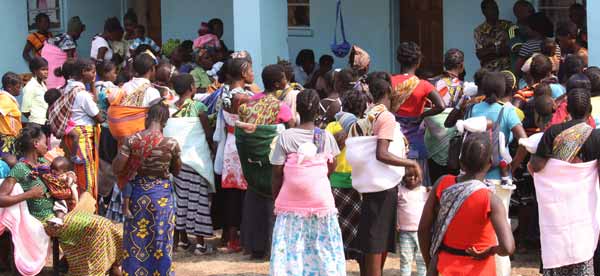
|
United States Peace Corps uses TeachAids to educate women in Zambia
HIV/AIDS in Zambia disproportionately affects women. There is significant mother to child transmission within the country, where ten percent of new HIV infections are in children under fourteen. Furthermore, among adults in their early twenties, the 2007 HIV prevalence rate among females (11.8%) was more than twice that of males (5.2%).
The United States Peace Corps volunteers in Zambia used the TeachAids software to educate women receiving health services in Matushi, a remote region in northwestern Zambia. Approximately eighty women visiting newborn clinics or family planning clinics participated in a health education viewing of the TeachAids software on a laptop while waiting to be seen. Copies were distributed within the village as well as to officials within the Ministry of Health.
“Your TeachAids video was the best I have seen as far as HIV education materials that was available from Peace Corps or in Zambia. It was interesting to watch and the message was very simple and easily understood…one of our HIV counselors…learned something new despite all of his previous trainings! _—_Marie Sather, Peace Corps Response Volunteer, Zambia
The Peace Corps in Zambia began in 1994 with a focus on Hygiene and Water Sanitation, and broadened to include Community Action for Health. In 2004, supported by the United States President’s Emergency Plan for AIDS Relief, the Peace Corps Zambia HIV/AIDS Project was created to focus on HIV prevention and care. It ultimately transformed into the Community Health Improvement Project (CHIP).
Peace Corps Zambia CHIP uses home-based delivery of health education on HIV prevention, malaria, and food security. Over 119 community volunteers address the needs of 10,000 people. With the recent acquisition of a laptop, the volunteers plan to show videos to facilitate small group discussions on HIV/AIDS. Volunteers with CHIP have also created a community-based program focused on marriage communication skills. Six couples in the community are training to promote conflict resolution, HIV/AIDS education, and HIV testing as couples. These innovative community-based programs are critical in the mission of HIV/AIDS prevention in Zambia.
TeachAids has a two-year history of collaboration with United States Peace Corps volunteers in HIV education. TeachAids software has been used by Peace Corps volunteers in Guyana to educate special needs teachers on important issues in HIV prevention, as well as in Guatemala to deliver HIV/AIDS prevention education for healthcare professionals. In Namibia, volunteers are using TeachAids to dispel HIV myths among young students.
TeachAids is proud to support United States Peace Corps volunteers in our shared goal to disseminate accurate and culturally appropriate HIV/AIDS education around the world.
Photo: Women gather to receive health services at a clinic in Matushi where the TeachAids animations are shown.